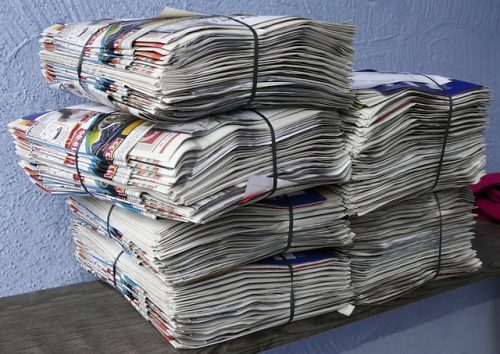Pakistani Universities and Their Paper Use- Sources and Amount
Pakistani education system in general utilizes a ton of paper annually. The Universities are no exception. From multiple paged admission forms to bi annual fee receipts that are discarded without a thought. This happens every year and the amount of paper waste generated is unprecedented.
Pakistan being a semi- arid region has only approximately 4.8 percent of region that is occupied by forests. One that is declining rapidly due to illegal deforestation and wildfires. The amount of paper we use is in no way just supported by deforesting our own forests but we also import paper. The sources and amount generated are too big to be sustainable and as a result we end up creating vast amounts of waste that goes unaccounted for. For more info, read: Life Cycle Of Paper Waste In Pakistan – What Happens To It?
One ton of paper is made by cutting down 17 fully grown trees. Therefore, saving on paper and reducing their usage will help prevent deforestation and save forests.
Related:
Deforestation- Causes, Effects and Solutions
Deforestation in Pakistan and Recent Reforestation Drives
In universities, paper is used for admission forms which typically range from 1-5 pages. To consider the sheer number of pupils being admitted every year in universities and using these admission forms only to be discarded later on. Most of the time the fee receipts generated have no purpose other than a formality. What can easily be shifted to online records maintenance in this day and age, is stifled by the traditional and less sustainable method of printing fee receipts that again go to waste.
An average undergraduate university student goes through 20,000 sheets in 4 years. This means 5,000 sheets each year not counting those that are provided by the university for exams and tests.
Why Pakistani Universities Need To Go Paperless?- Some Suggestion for Going Paperless
As mentioned above, Pakistani universities heavily rely on paper for every documentation, exams, tests, admission forms, application forms etc. The reliance on using paper is truly absurd since in many cases there are better alternatives available that are cost-effective, eco-friendly as well as help in waste reduction. Some benefits of going paperless are:
- Time- saving: shifting every student’s data to online database allows more space, no storage issues, easy organizing and managing along with no need for manual filing of records.
- Saves space and money: especially minimizes printing cost of ink, electricity for printing itself as well as storage for all the paper.

- Improved security: password protected databases improves security and student information as opposed to randomly sorted and difficult management of hardcopy documents.
- Helps student avoid carrying huge amounts of assignment and research papers, notes and other books that can easily be available to them in the form of PDFs or PowerPoints.
Some Suggestions on how Universities can go paperless:
- Practical Copies: many university departments across Pakistan require each student to make practical copies for multiple subjects throughout their academic year. This practice is quite redundant as it does not serve any purpose other than fulfilling a formality due to lack of practical exposure for students.
Getting rid of this trend of practical copies will not just save student’s time but also reduction in paper use. One practical copy of one student numbers at approximately 25-30 pages. By cutting down on this practice, we can greatly reduce our paper waste as well as help reduce deforestation by reducing demand. If practical copies need to be made still, then students can submit them online via emails or word documents. - Online Assignments: Assignments in hardcopy form that have a maximum of 4-7 pages on average by a student can be avoided in favor of submitting them online as soft copies via emails. This will save time, effort and cost of printing, and undoubtedly the paper usage that is severely depleting the forests of the world.
- Online Databases: Regarding admission processes, each year universities across the countries have millions of students hoping for a chance to study undergraduate. Some universities have provided the option of submitting online applications instead of in-office submission in paper document form. Shifting from traditional process to online greatly reduces the carbon footprint of individuals that they would leave due to transport to and from the office as well as save time, effort and provides ease. Read, All You Need To Know About Carbon Footprint
- Notes and Books: Instead of providing notes in the form of hardcopies and students taking lectures in class on notebooks; universities need to normalize and allow students to take notes and lectures on electronic gadgets be it their mobiles, laptops or tablets etc. To further reduce the cost of paper, PDFs of books can be shared in online class groups instead of having each student buy a book they will use just for one semester.
- Research Papers: at the time students start their research, they are typically required to print out dozens of research papers. This is also a waste of paper that can be avoided by just emailing the relevant papers to the supervisor. Same goes for when students are drafting their research paper and knowing that the initial draft is going to be rejected multiple times by the supervisor. Beforehand thorough discussion with supervisors can prevent the need for all this printing.Thus, these were some suggestions that can be followed so that nothing except exams need to be taken on papers. This small amount of paper waste would still be manageable sufficiently enough to be considered for recycling by each department.
CONCLUSION:
Although people aim to reduce their waste in various aspects of their lives, somehow the same does not extend when it comes to education sector. This is pretty ironic. Many do not take into account the amount of energy consumed by a printing machine and carbon emissions generated. Not to mention the cost of producing all the single sheets of paper from pulping, to bleaching etc.
The paper industry itself is quite harmful due to its release of GHGs and other pollutants like NOx; as if deforestation was not enough. It is high time that Pakistani universities shift from paper based education to more practical ways that is true to the spirit of environmentalism- especially when the alternatives are easily accessible and feasible.
Related: Sustainable Forest Management- Methods and Advantages
What is Carbon Sequestration? – Techniques and Importance
We hope you liked this post! Please comment below if you have any suggestions, comments or feedbacks! We at #envpk love hearing from readers! Thanks




